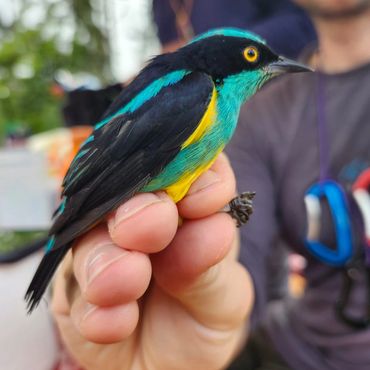Rancho Tangaré Bird Ringing Station
The establishment of a bird ringing (banding) station at Rancho Tangaré Private Reserve (RTPR), has taken place in order to study and assess the change in avian biodiversity in terms of population and diversity of species. As the reforestation of the historically degraded land and enrichment of the subtropical forest within RTPR, with high conservation value tree planting and management continues. Our long term monitoring will provide vital data which will influence future management of the reserve as well as contribute to various research projects.
Our rings/bands are inscribed with BIRDBAND.EC with larger rings also including RANCHO TANGARE ECUADOR followed by a series of letters and numbers. If you have found or recaptured a bird with one of our rings please report it by clicking the button below!






Constant Effort Site (CES)
The bird ringing (banding) station aims to be a constant effort site where ringing operations and survey work takes place on a regular basis in order to understand the population dynamics of the bird species present at Rancho Tangaré Private Reserve. This will enable us to understand how the reforestation of the reserve impacts the avian population.
At present we operate mist nets on three locations within the reserve, with each having different habitats and topography. This is done to ensure that firstly the sites remain the same to establish a data baseline and secondly to ensure that as many different habitats are studied as part of the bird ringing project. Ringing generates information on the survival, productivity and movements of birds, helping us to understand why populations are changing.
Ringing birds is essential if we are to learn about how long they live and when and where they move. Placing a lightweight, uniquely numbered, metal ring (band) around a bird’s leg provides a reliable and harmless method of identifying birds as individuals. Additional biomentrics are taken and recorded when birds are captured which includes the age, sex, wing measurments, weight, fat and muscle scores (fitness) and evidence of any breeding.
Presently we have ringed 93 species which includes passerines, hummingbirds, birds of prey and waterfowl. All bird ringing operations are currenty undertaken by British Trust of Ornithology trained Ringers from the United Kingdom.
We keep an online database of all the birds we ring (band) along with the biometric data we gather from each individual. If you require any information and/or data for academic or research purposes on the birds we ring please contact martin@riosandinos.net with your request.

Bird Surveys
In addition to the bird ringing (banding) effort, bird surveys take place regularly in order to keep an updated species list for the reserve, as we are unlikely to catch every species present during ringing operations. As our ringing operations are currently limited to certain times of the year, this extra effort helps to keep monitoring up to date and enables us to understand more about the population changes taking place across the reserve as the reforestation work continues year-round. A list for the reserve is maintained on eBird, currently as of November 2025 the list stands at 262 species.

Join Our Team as a Volunteer!
We are always on the look out for volunteers, especially experienced bird ringers/banders that hold valid permits in their country of origin or people with good identification knowledge of the birds and other taxa of Ecuador who have field experience assisting on research projects related to wildlife monitoring.
Please note that ringing expeditions are presently occuring on a yearly basis, with the next expedition planned for late October 2025 (Currently Full). The dates of any future expedtions will be posted below:
- Early November 2024
- Late October 2025
- TBC 2027
- TBC 2028
- TBC 2029
Applicants must be in good physical condition, as the reserve features steep trails that require demanding hiking. They should be comfortable with remote living and working in a tropical environment, which includes hot and sunny weather, heavy rain, as well as the presence of snakes and biting insects. Please note that applicants must be aware and able to cope with potential power blackouts and water shortages that affect the country during the dry season.
Proficiency in both English and Spanish is also essential.
If you are interested then please fill out the "Apply Now" form and attach a cover letter of no more than 300 words, outlining your experience/qualifications and why you would like to assist on the projects or if you have a project in mind that you would like to establish at Rancho Tangaré Private Reserve.
